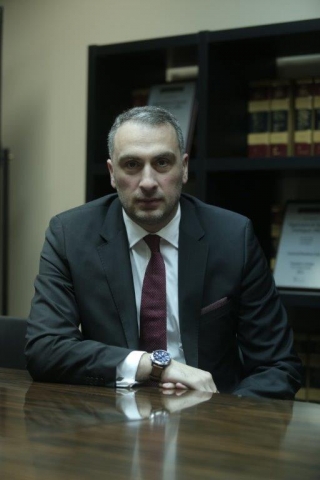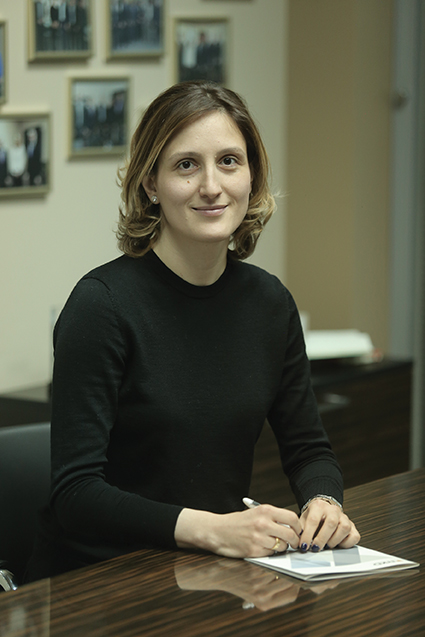Strengthening Governance & Improving Public Services
Interview
Mgaloblishvili Kipiani Dzidziguri (MKD) has been at the forefront of the Georgian legal market for more than two decades, emerging as a strong, highly competitive and well-respected Georgian law firm, providing a full range of legal services to its clients. The firm is proud of the external recognition it has gained through client assessments in a range of international research-based guides for the legal profession, which regularly list MKD amongst the top performing law firms in Georgia. However, in today’s realm, along with being a law firm of highly recognized legal practitioners, it also views itself as a law firm concerned with defending the system of justice. GEORGIA TODAY spoke to three members of the firm to find out more.
“We, as a firm, are willing to have measurable impact on positively changing the Georgian legal ecosystem, promoting equal justice and rule of law through advocacy, policy research or other initiatives,” says Tamara Tkeshelashvili, Member of the Management Board, lawyer. “We are strong believers in helping and giving back to the local community by participating or initiating actions aimed at supporting the rule of law.”
MKD provides job training opportunities for law students, and exercises “strategic social investment” by supporting legal education, contributing to shaping the students as competitive legal professionals.
“Many of our staff members are involved in teaching at various law schools, dedicating their time and efforts to sharing their practical experience to the students in an academic setting,” Tkeshelashvili tells us. “We, as a business, definitely see our role in the advancement of the rule of law, and we are well aware of the intertwining nature of the relations with the community in which we operate.”
MKD is just a few years younger than the modern Georgian state, which regained its independence back in 1991, so it has had a firsthand view of Georgia’s path to democracy, its attempts at institution building, and has witnessed waves of reforms aimed at reshaping the government institutions for strengthening the governance and improving the public services.
“Even though Georgia ranks as the leader in the region of Eastern Europe and Central Asia for the rule of law, and the corruption perception index is relatively low, there is still a room for greater improvement in these areas,” Mariam Antia, Member of the Management Board, lawyer, tells GEORGIA TODAY. “Increased transparency and straightforward accountability, broader disclosure requirements in both public and private sectors, in our view, would help to enhance Georgia’s profile as an attractive investment destination - a place with predictable rules of the game for local and international businesses alike.”
What she says they observe in Georgia is that the general notion that the law should apply equally to all, without exception, and that the law reigns supreme, is understood. “Nevertheless,” she says, “the application of this principle in daily life still seems challenging. The difficulties are caused both by a lack of uniform application and enforcement of laws by the courts, and by the perception that the laws are not always clear, or for the benefit of the public. Rather, at times, they are viewed as tools for arbitrary manipulation.”
MKD recognizes that, in terms of law enforcement, the implementation of the rules and ensuring of judicial independence is the key challenge. The government and the general public must take all necessary measures to ensure the strengthening of the efficiency of the justice system and development of a strong institutional framework for an impartial and highly professional judiciary. “Without fair and predictable justice system and user-friendly and business-oriented public services, we cannot expect investors to have long-term commitments with respect to Georgia,” Antia notes.
“Effective governance, leading to provision of reliable public services, is the most genuine denominator when speaking about the overall effect of key ingredients of a rule-based order and entrepreneurial economy,” Victor Kipiani, partner and co-founder of MKD, tells us. “Driving state institutions to work better and be result-oriented is to make the country a better place in which to live and work, both for its nationals and expats. Putting it in a simple way: if you are not happy with the environment you live in; if you are hesitant about the true impact of your work or unsure how your efforts resonate through effective governance (read: public services), then clearly there is a big disconnect between a state and its nationals legal-wise and in terms of emotional bonds. And, in fact, we often seem to assume that effective management in the public sector has the same basic qualities as effective management in the private sector.”
He notes that public halls, both central and regional, contribute a lot to solidifying those bonds and making businesses and individuals feel that the state cares and supports them in every possible way. “In a very practicable meaning, the famous concept of a “one-stop” public service delivery, with 450 services delivered in one accessible spot, speaks eloquently for itself. On top of this is the concept of a unified business services' hall aimed at making doing business easier and more cost-effective. Among other initiatives, these are the very material steps to illustrate a real sense of accountability from public institutions and making them responsible for developing business and infrastructure.”
“Such junctures facilitate breaking through the soviet legacy to give citizens a sense that the state is their own but not something which is detached from their daily needs and expectations. Such a ‘dynamic flux’ serves not only a mundane flow but a wider agenda too, as it helps to solidify nation-wide stability by making a still impoverished country less susceptible to internal shocks and external impacts. This is even truer for Georgia which tries to develop as a vibrant democracy in an environment hostile to institutional building and rule of law,” Kipiani says, going on to highlight that the ultimate success of Georgian reforms is heavily hinged in the opening the doors for greater participation in political and economic processes and, as a result, accomplishing greater inclusivity. “This is where we are still observing the stumbling point, as the middle-class is in its embryonic stage, the vestiges still exist of somewhat monopolistic business elites, plus there is a lack of access to much needed finances to start and grow a business, all causing a virtuous circle by not introducing up-to-date dynamics and achieving the mentioned inclusiveness,” he adds.
“Among the instruments of modernizing the political and economic system, and apart from a well-know toolkit of political leverages and initiatives, there is a reversing of the legislative pendulum towards downsizing the red tape and reforming the public services, essentially by putting it on the authentic premises of meritocracy and transforming it into a bona fide service provider,” Kipiani says. “Any other attempts to develop the Georgian economy would miss the mark of sustainability and inclusiveness; that, in turn, risks failing to replace old economic realms with new ones while undermining and destabilizing power relations in politics. In view of these challenges, which are so characteristic to systems in transition, girdling the Georgian pace of finally transiting from "drifting" to an institutionally-based net of economic and political "free floats" by deeper critical junctures is an undeniable pass to the point of emerging as a modernized country with an innovative and competitive business habitat. At the same time, however, we all should bear in mind that modernizing the economic fundamentals is good, but this should not be as like paying lip service to democratizing political life and empowering fairly broad sections of society. Otherwise, you would not be able to engineer prosperity and, consequently will fail to make the nation impervious to the extent admissible nowadays, to social unrests or outer aggressions, be they through exercise of either soft or smart power.”
By Katie Ruth Davies













